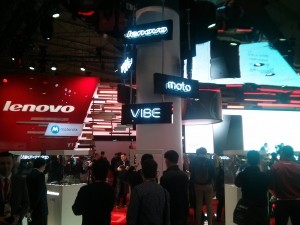SMARTPHONES: Struggling Lenovo in Need of New Leaders
Bottom line: Lenovo’s longtime CEO Yang Yuanqing should resign or be replaced to make way for new leadership to turn around the company’s struggling mobile unit that will be critical to its future.

The global smartphone spotlight is in Barcelona this week, as industry giants including China’s Huawei and ZTE (HKEx: 763; Shenzhen: 000063) unveil their latest new models at the world’s biggest telecoms show. But one company that’s unlikely to generate much buzz is PC stalwart Lenovo (HKEx: 992), which has disappointed for the last 2 years by failing to gain traction in a smartphone business that will be critical to its future.
To the contrary, Lenovo saw its smartphone sales tumble last year in its home China market, which accounts for about half of its total revenue. The dramatic plunge is all the more worrisome since Lenovo was hoping for a surge last year after its purchase of Motorola, which once enjoyed a reputation as a global leader but later fell onto hard times.
This major stumble in such a critical area has taken a toll on Lenovo’s stock, which has lost more than half of its value over the last 9 months. The failure owes to a number of factors, mostly related to product design and marketing. But the responsibility ultimately lies with longtime CEO Yang Yuanqing, who should consider stepping down to pave the way for a new generation of leaders to fix the situation.
If he fails to go on his own, Lenovo’s board and its controlling stakeholder Legend Holdings (HKEx: 3396) should consider removing him from his position. Such a move would be quite common at any major western firm that runs into trouble. But it’s relatively rare in China’s young private sector, where companies are often controlled by their founders who refuse to leave even when their fortunes fade.
Lenovo’s latest smartphones will be on display this week at Mobile World Congress in Spain, but are unlikely to generate much buzz due to their reputation as low-cost and lacking in features that set them apart from the many generic look-alikes made by a crowded field of Chinese brands. By comparison, new models from rival Huawei are likely to attract far more attention, banking on the company’s more unique product designs and strong marketing campaigns that fueled a 50 percent sales surge last year.
Lenovo CEO Yang became a high-tech star 4 years ago, when the company officially passed US giant HP Inc (NYSE: HPQ) to become the world’s biggest PC seller. Not long after that happened, Yang began citing smartphone giants Apple (Nasdaq: AAPL) and Samsung (Seoul: 005930) as his new major rivals, acknowledging the future importance of mobile products as traditional PC sales crested and began to contract.
Plunging Sales
But the latest data released last week show just how poorly Lenovo has performed in its bid to position itself as a major smartphone player. The company’s sales in its home China market plunged by two-thirds in last year’s fourth quarter, as it sold only 3.4 million smartphones compared with 10.2 million a year earlier, according to data tracking firm IDC. (previous post) As a result Lenovo only managed to finish 10th in the market, far behind lesser known players Oppo and Vivo.
The stumble was all the more worrisome because Lenovo has huge advantages over everyone else in China due to its long experience as a leading consumer electronics brand. That legacy has given it extensive sales, distribution and service networks reaching down into even the smallest cities, along with marketing experience that has given its name a high degree of confidence among consumers.
Failure of Lenovo’s smartphone transition hasn’t happened overnight, and was apparent throughout much of last year. The turmoil made headlines last June, when Lenovo’s mobile division chief Liu Jun finally quit after 4 years on the job.
The latest data show that Lenovo’s performance hasn’t improved since that time, and Yang’s boss Liu Chuanzhi has also shown growing signs of frustration at the lack of progress. (previous post) While Yang should be commended for his earlier success at winning the global PC crown and building China’s first global high-tech brand, he should also realize that perhaps it’s time for change and offer to resign to make way for new leadership.
Such leadership could come from a number of sources, both domestic and foreign. Two strong candidates could include Lenovo’s recently named president and industry stalwart Gianfranco Lanci, and Richard Yu, the man behind Huawei’s meteoric smartphone rise. Failure to take decisive action soon will only prolong the company’s slump, and could even endanger its status as a leading global brand.
Related posts:
- SMARTPHONES: 2015 Graces Huawei, Punishes Lenovo
- SMARTPHONES: Lenovo Founder Liu Losing Confidence in CEO Yang?
- PCs: All Signals Point Down for Wearying Lenovo
- Today’s top stories
(NOT FOR REPUBLICATION)
